FCA Revised Product Plans- Focus on Jeep, Ram, AR, & Hybrids
#1
via Detroit Free Press
Fiat Chrysler Automobiles CEO Sergio Marchionne said today that the Dodge Dart and Chrysler 200 sedans will eventually be discontinued as the automaker refocuses its efforts on the production of its popular Jeep SUVs, Ram pickups and boosting its electric vehicle lineup.
Marchionne said the strategy is a response to market trends in the U.S. that include gas prices that have dropped to about $2 per gallon and a shift in buying patterns among Americans back to crossovers and trucks instead of cars.
The strategy also is designed to help the automaker boost production capacity for Ram and Jeep and suggests that the company will move the production of some of those models to other plants. Currently, the company cannot make enough Jeep Cherokees and Jeep Wranglers to meet demand and also struggles to make enough Ram pickups.
"We have decided to de-focus, from the manufacturing standpoint, to de-focus on the passenger car market. There are two cars in particular, the Dodge Dart and Chrysler 200, which will run their course," Marchionne said during a conference call with Wall Street analysts on Wednesday. "Without creating additional capacity, in the United States, we need to ... to try and deal with the development of both Jeep and the Ram brand."
The news is stunning, given the investments made to develop the Dart and the Chrysler 200. The automaker invested more than $1 billion to overhaul its Sterling Heights Assembly Plant to build an all-new Chrysler 200 midsize sedan that launched in 2014 and spent $600 million to launch the Dart compact car in 2012. To be fair, many of the improvements made at both plants help the automaker build any vehicle.
The Dart failed to meet sales expectations. It is among the larger compact cars on the market and is priced higher than competitors. Just over 87,000 were sold last year. The Chrysler 200 has been praised for its exterior styling and is viewed as a competitive car in its segment but has cramped rear seats.
Marchionne hinted that the Dart and Chrysler 200 could return to the market if FCA found another manufacturer willing to build the cars.
"There will be a number of things that will be put in place in the next 18 months -- things that have been agreed and detailed, that will effectively withdraw the Chrysler 200 and Dodge Dart from the marketplace, for a long period of time, during which we will be continuing discussions with potential partners," Marchionne said.
The automaker now is aiming to sell more than 2 million Jeeps globally by 2018, an increase from its prior target of 1.9 million annual sales. FCA sold more than 1.2 million Jeep SUVs globally in 2015 -- the most in the history of the brand.
While the strategy will help FCA find additional capacity for its most popular vehicles, it also positions the company as largely a manufacturer of trucks and SUVs. Removing small cars from the lineup leaves FCA vulnerable to gas price increases in the future.
Marchionne said decisions have been made to help the company achieve the production capacity it needs for Ram and Jeep. A number of plans will be put in place over the next 18 months, but he but did not outline those plans.
The Chrysler 200 is made in Sterling Heights and the Dodge Dart is made in Belvidere, Ill. The Free Press, along with a number of other publications, have previously reported that the automaker plans to move production of its Ram pickup to Sterling Heights and move its Jeep Cherokee to Belvidere, Ill. It also is expected that the Jeep Grand Wagoneer will be built at Warren Truck.
Marchionne did not confirm any of those moves today.
The automaker has said it will launch its next-generation Jeep Wrangler in 2017, and will make the Wrangler in Toledo in the plant where the Cherokee is currently made. The company has not said what vehicle it will produce in plant in Toledo where the Wrangler is currently made.
ďI think the important thing for us to reinforce is the fact that the Wrangler, in its new home in Toledo, will have additional production capacity available to try and meet demand on a global scale, and I think itís important for us to have found a home for the Grand Wagoneer family, both the Grand Wagoneer and the Wagoneer in whatever shape they come," Marchionne said.
There are also plans to add diesel and hybrid electric versions of the next-generation Jeep Wrangler when it goes on sale by 2018. The company also plans to offer "next-generation powertrains" on its next Ram pickup and produce a mild hybrid version of its Ram pickup.
In 2014, Marchionne unveiled a plan to spend $52 billion (48 billion euro) over five years in his quest to boost annual sales of cars and trucks from 4.6 million in 2014 to 7 million by 2018.
That plan leaned heavily on a goal to relaunch the Alfa Romeo and Maserati brands globally and counted on substantial future sales from China. FCA initially intended to spend $5.5 billion (5 billion euro) by 2018 to launch eight new Alfa Romeo models in a bid to make the sporty premium brand a true competitor with the likes of Audi, BMW, and Mercedes-Benz.
Today, FCA said it has extended its time frame for the introduction of those eight Alfa Romeo models to 2020 and has reduced the amount of money it plans to spend by 2018 on the brand.
Since announcing that plan, the outlook for the automotive industry in China has changed, forcing Marchionne to delay some Alfa Romeo models and move up the introduction of others.
Marchionne said the automaker still plans to launch the Alfa Romeo Giulia sedan in the U.S. by the end of the summer. While the small Alfa Romeo 4C roadster went on sale in the U.S. last year, the Giulia is expected to be the first car to appeal to mainstream premium car buyers since Fiat pulled the brand out of the U.S. in the mid-1990s.
Under the updated plan announced today, FCA said it will "recadence" the timing of the Alfa Romeo models and is now aiming for more sales to come from North America and Europe than in its prior plan.
What we know and what we don't know
A long-awaited, updated business plan released by Fiat Chrysler Automobiles CEO Sergio Marchionne answered a number of questions on Wednesday, but left many critical questions unanswered and raised new questions.
What we know that we didnít know before:
What we donít know (for sure):
Marchionne made comments about the "Wagoneer family" and mentioned the "Grand Wagoneer" and the "Wagoneer." It's unclear what this means. Before Wednesday, the company had only confirmed plans for one large Jeep Grand Wagoneer.

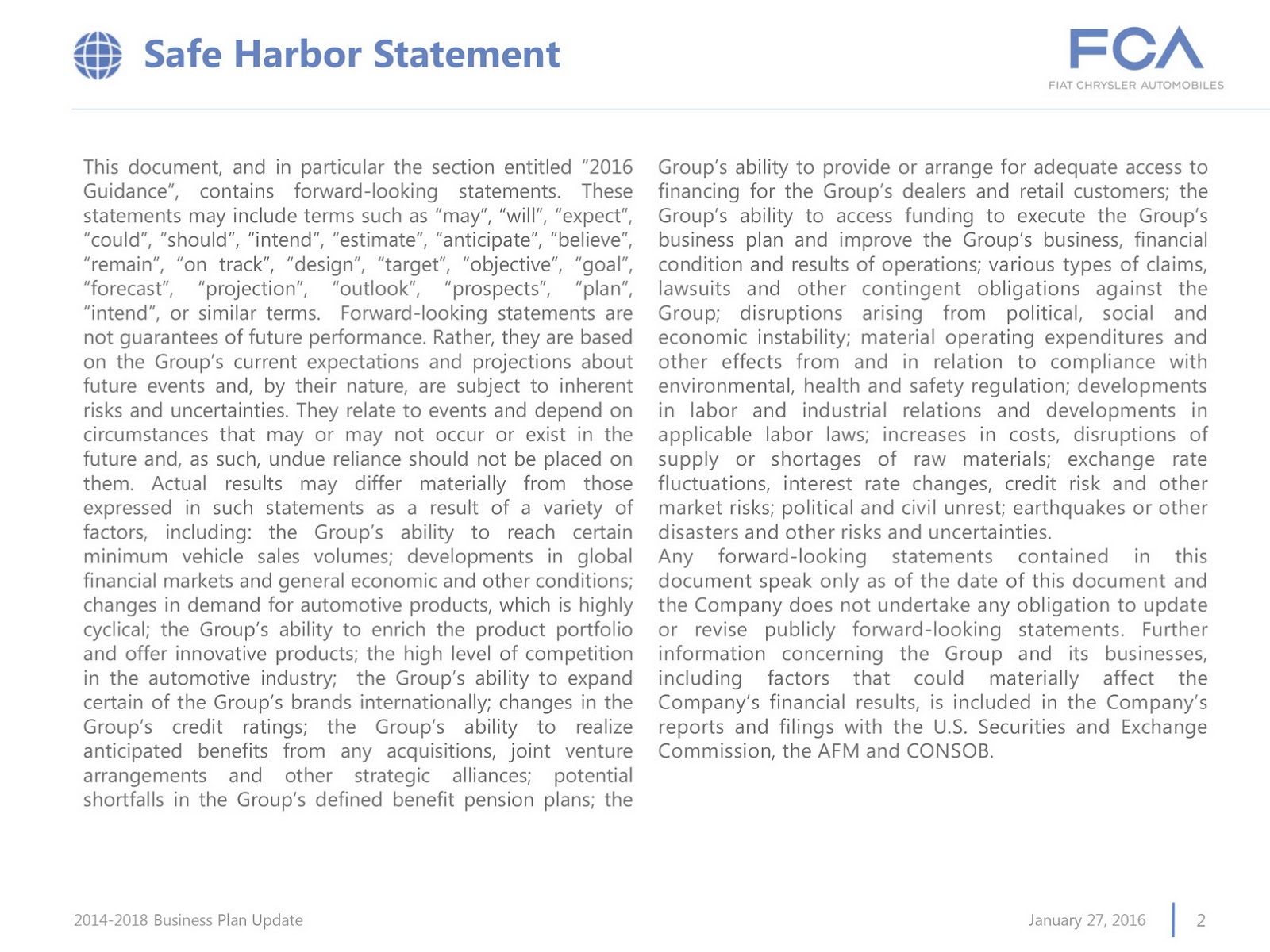

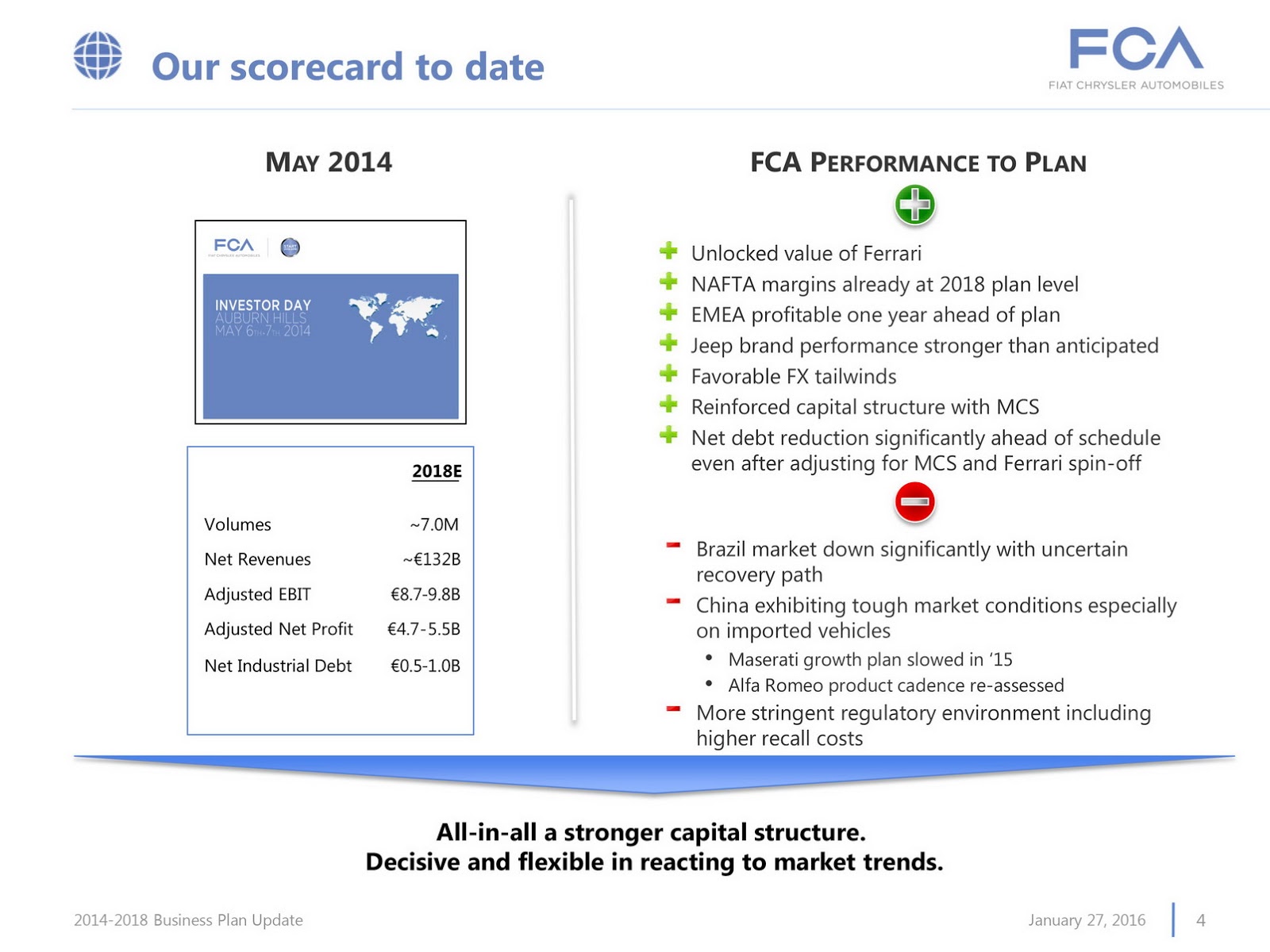
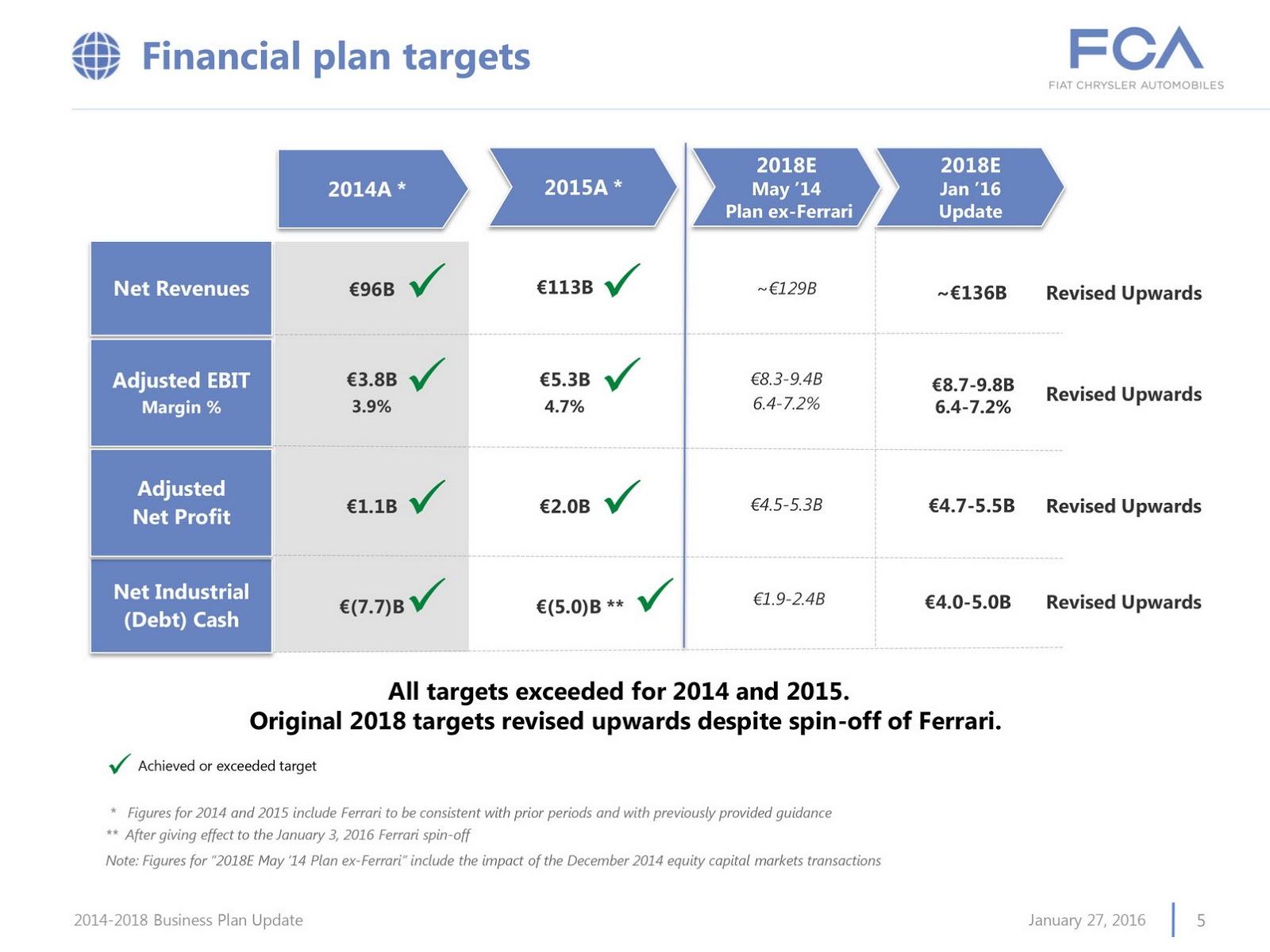

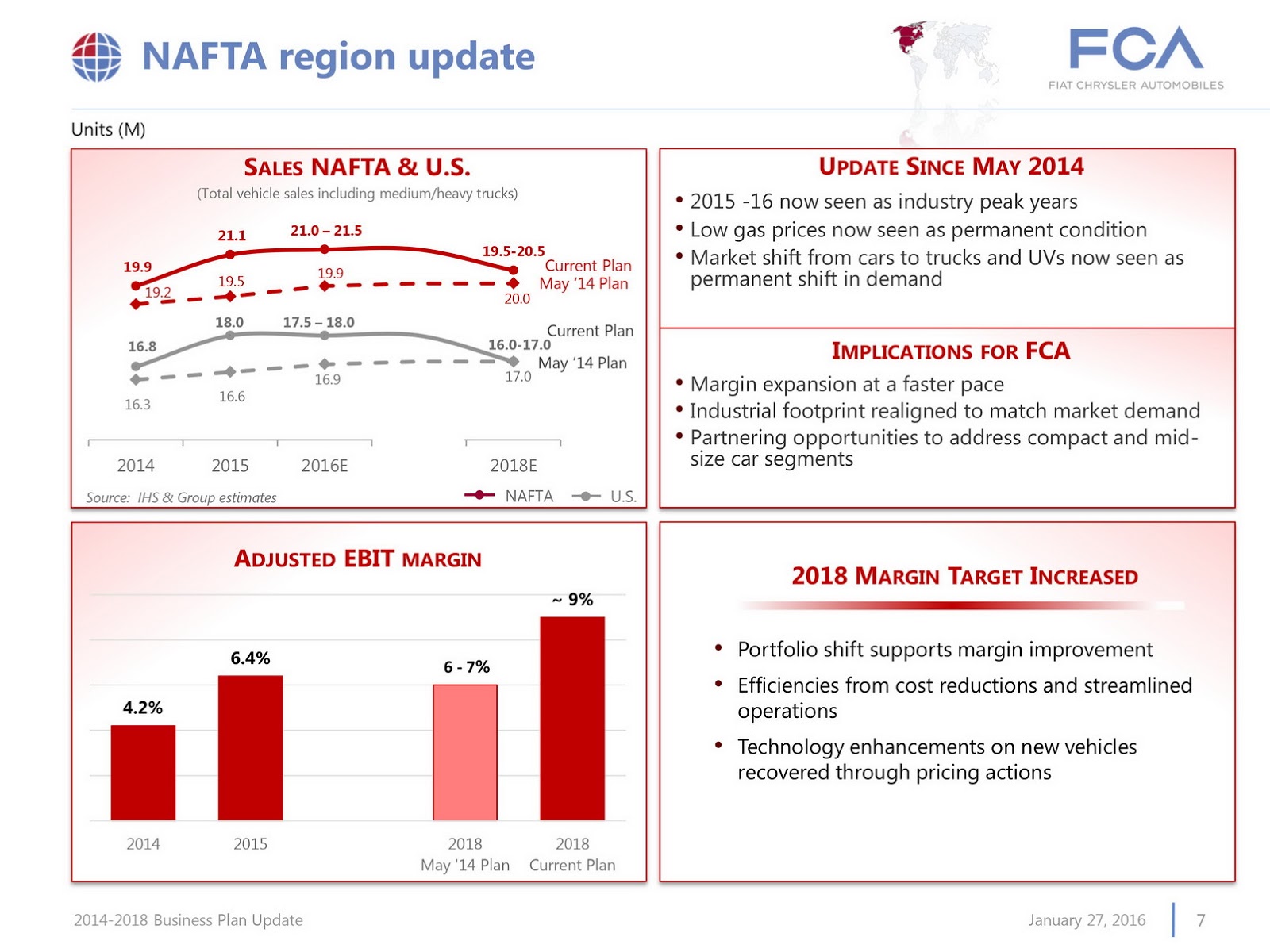
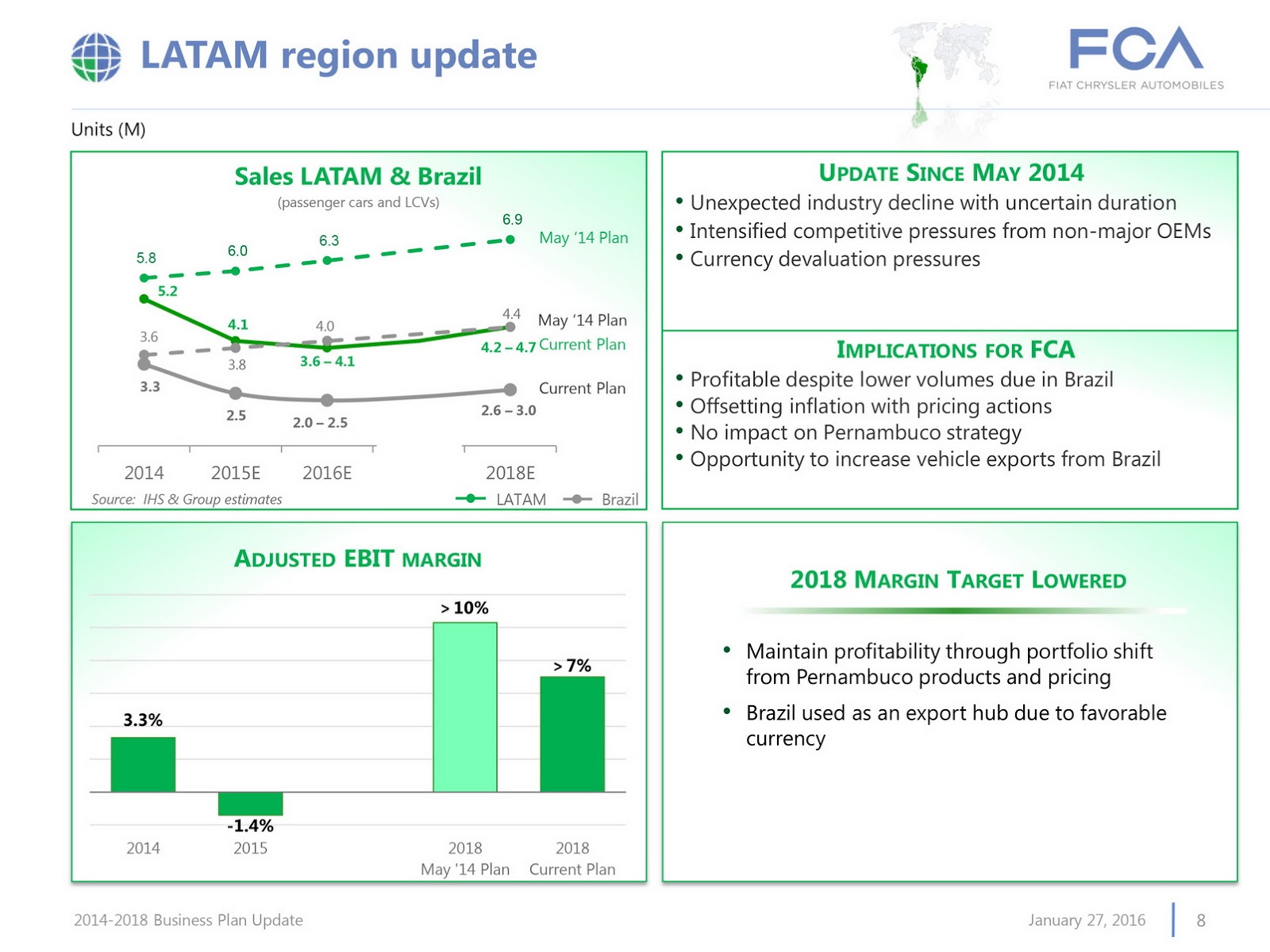
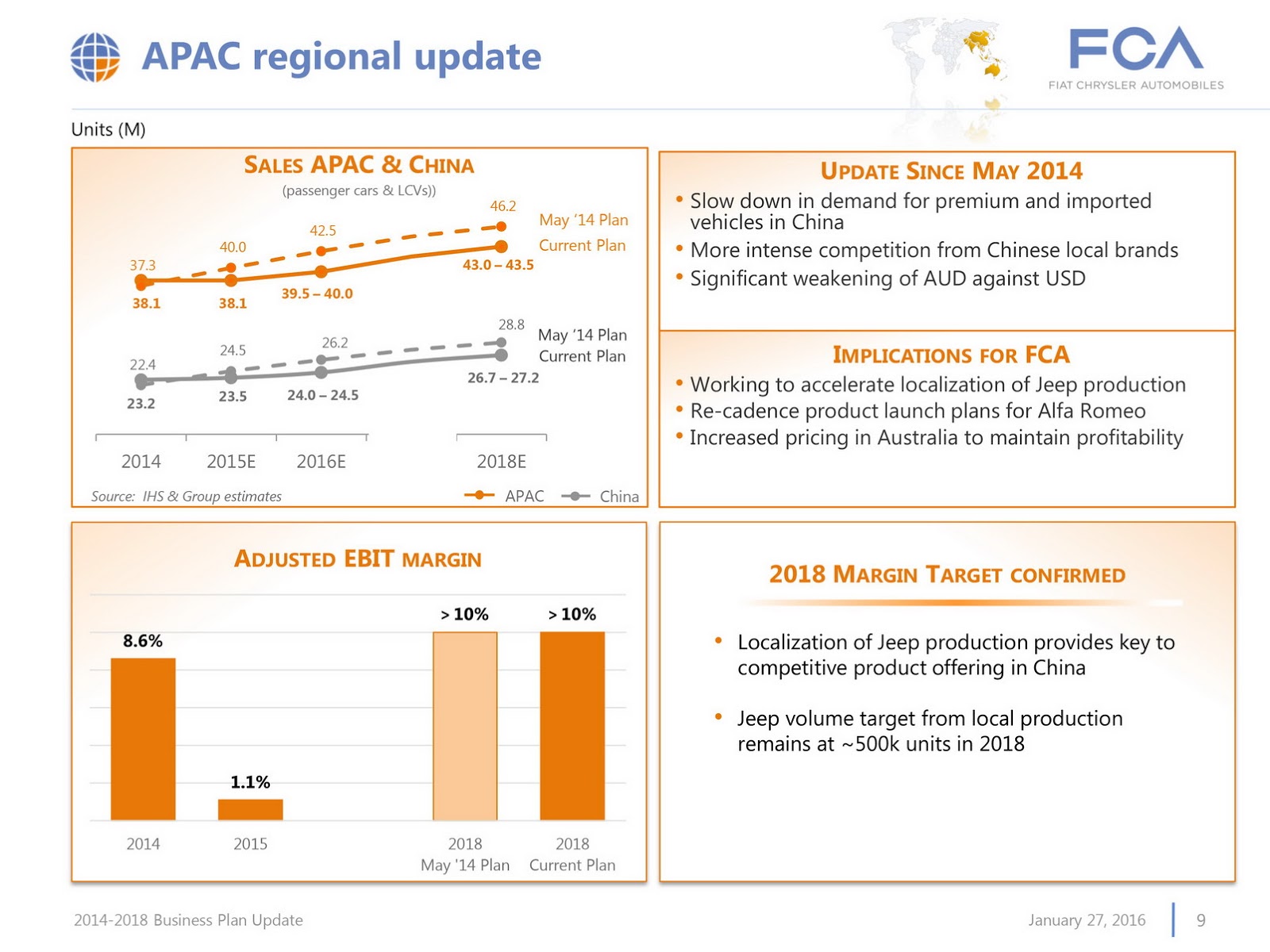
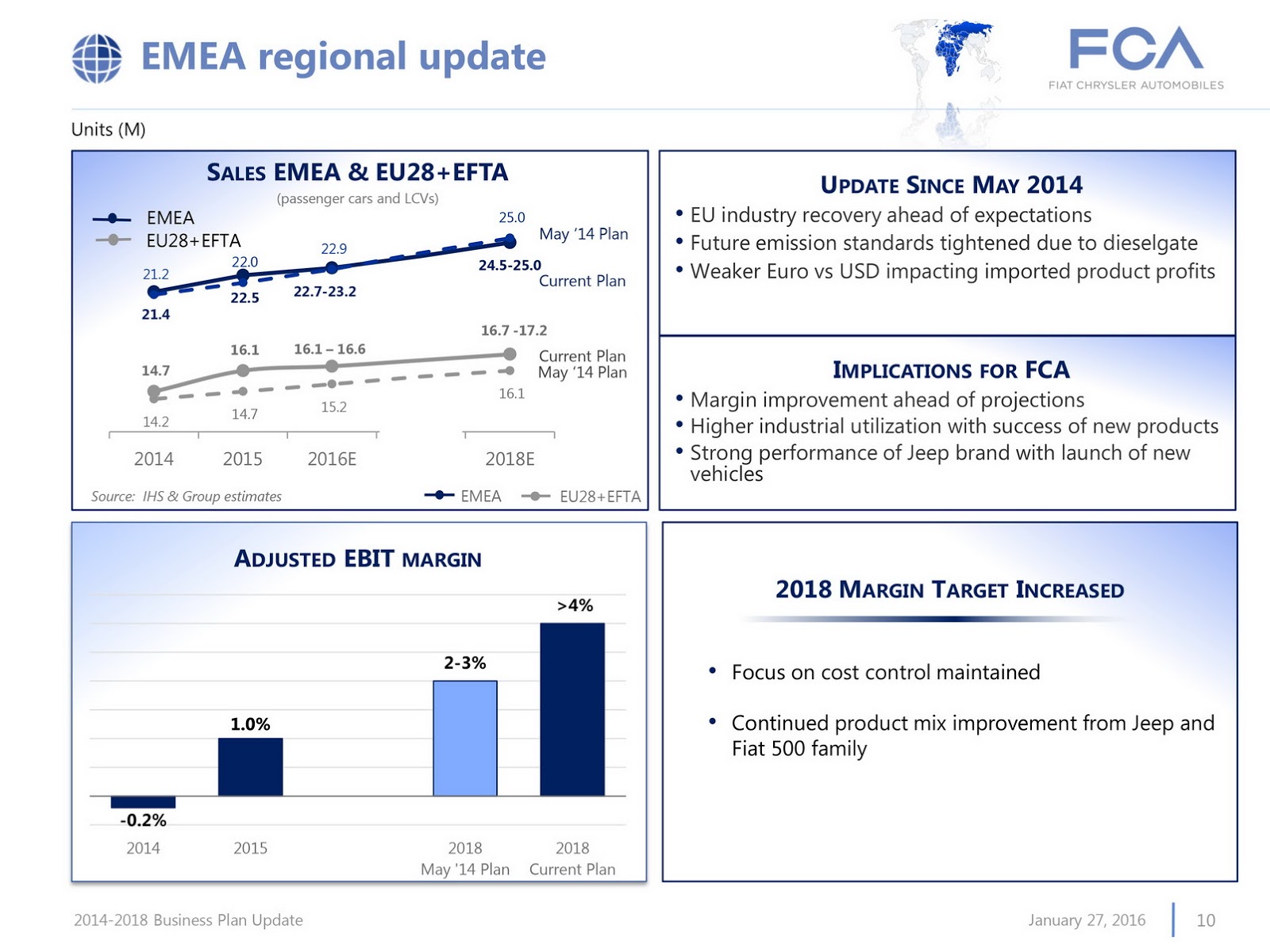
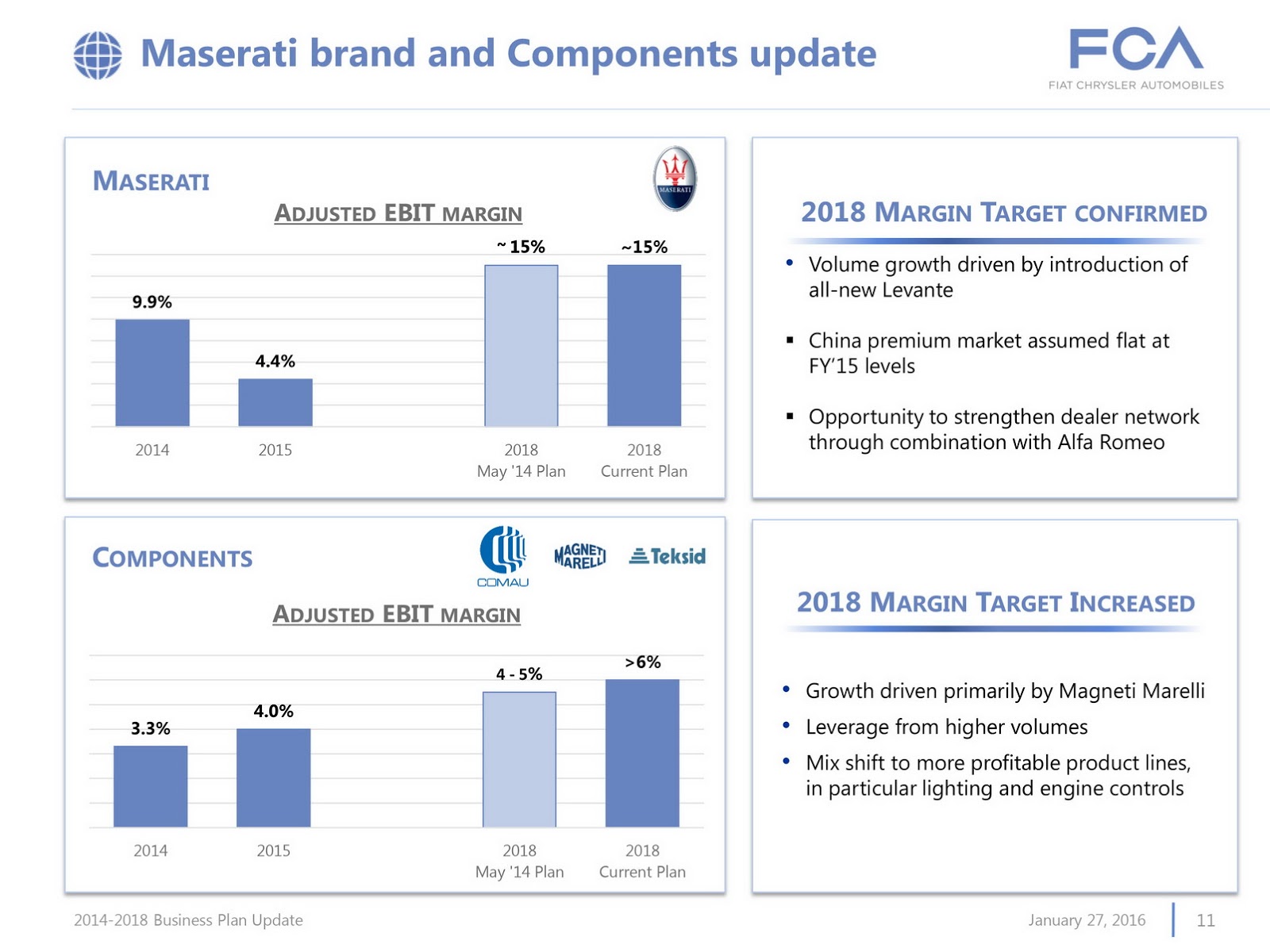
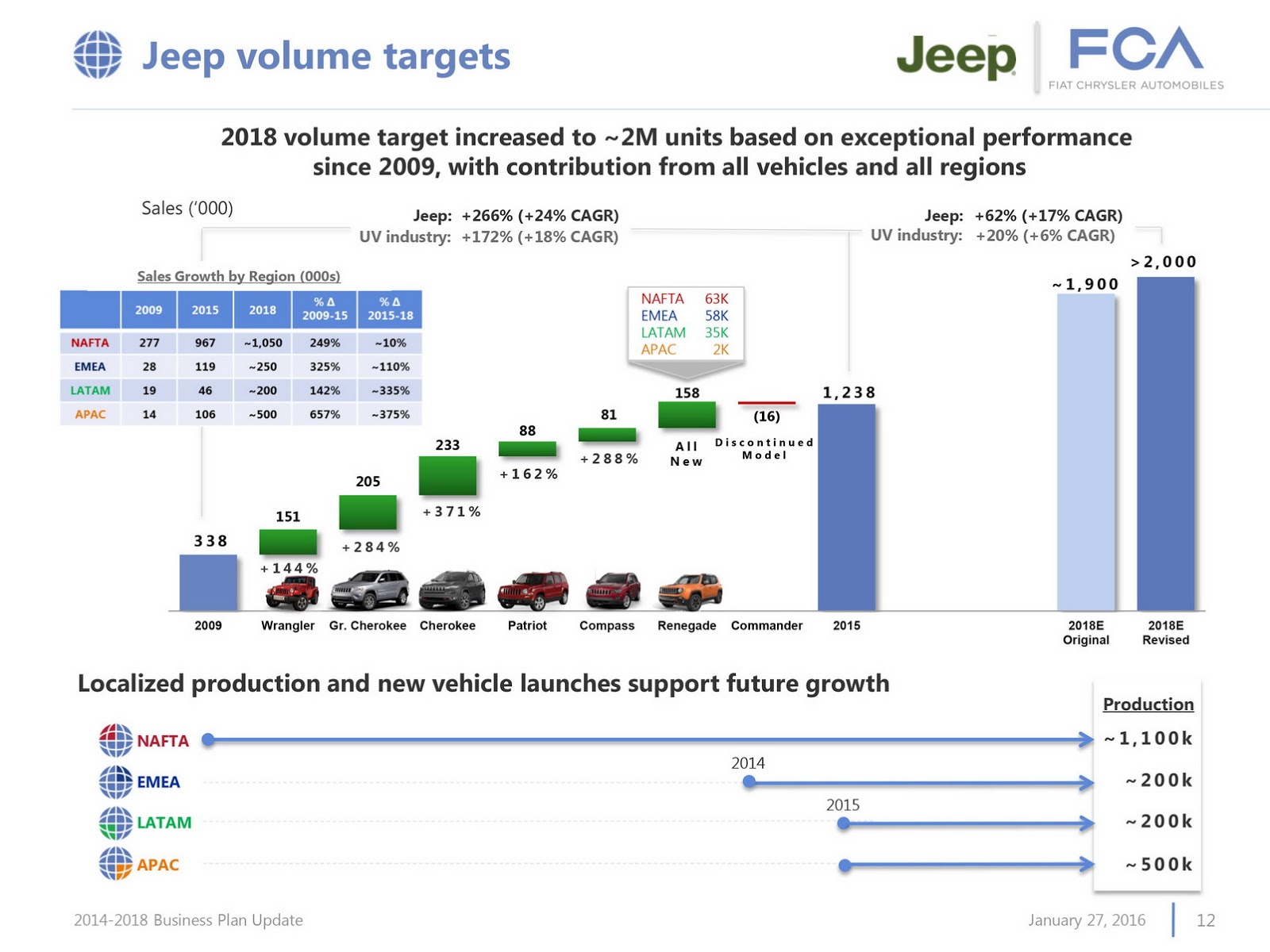
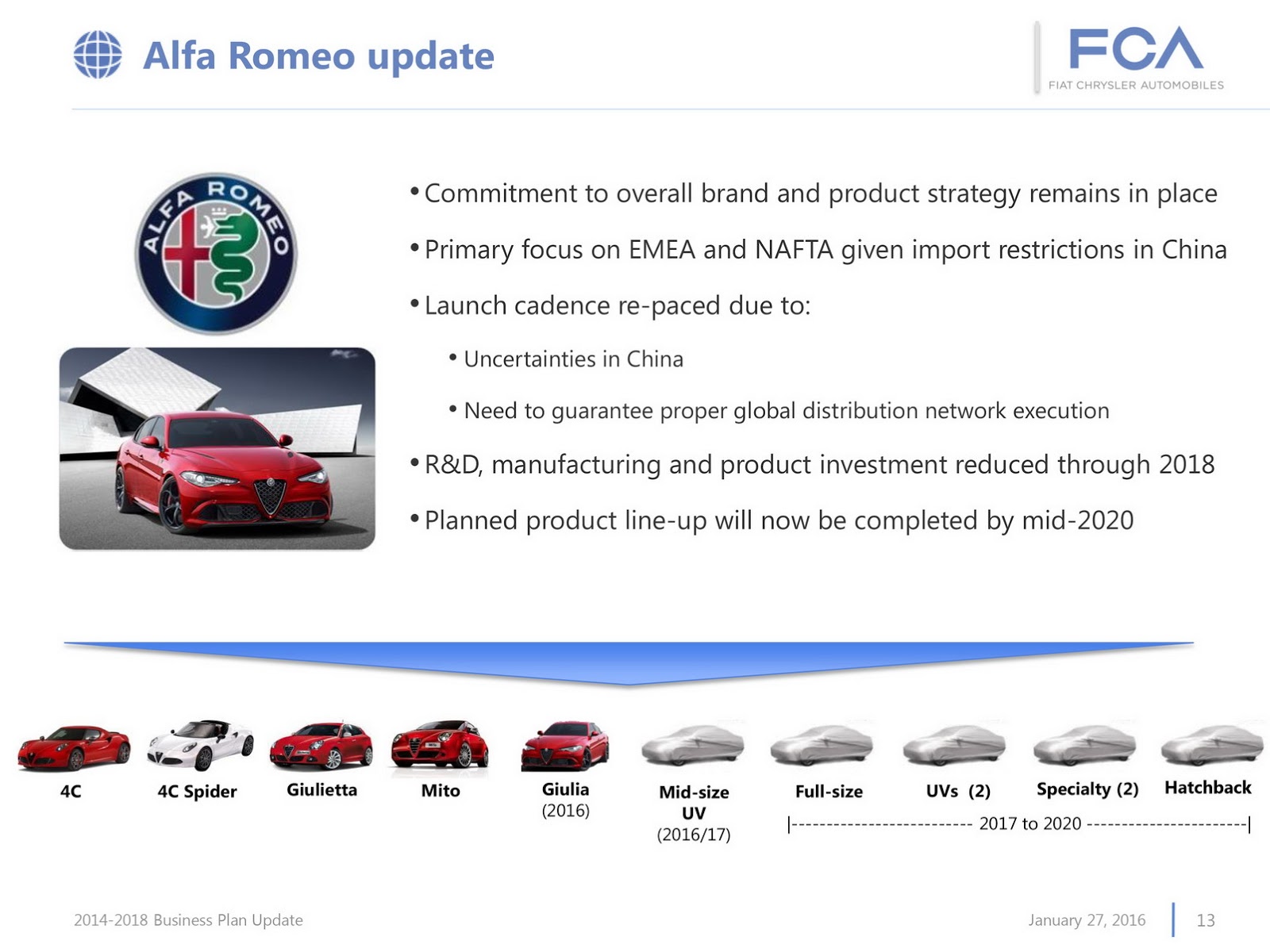
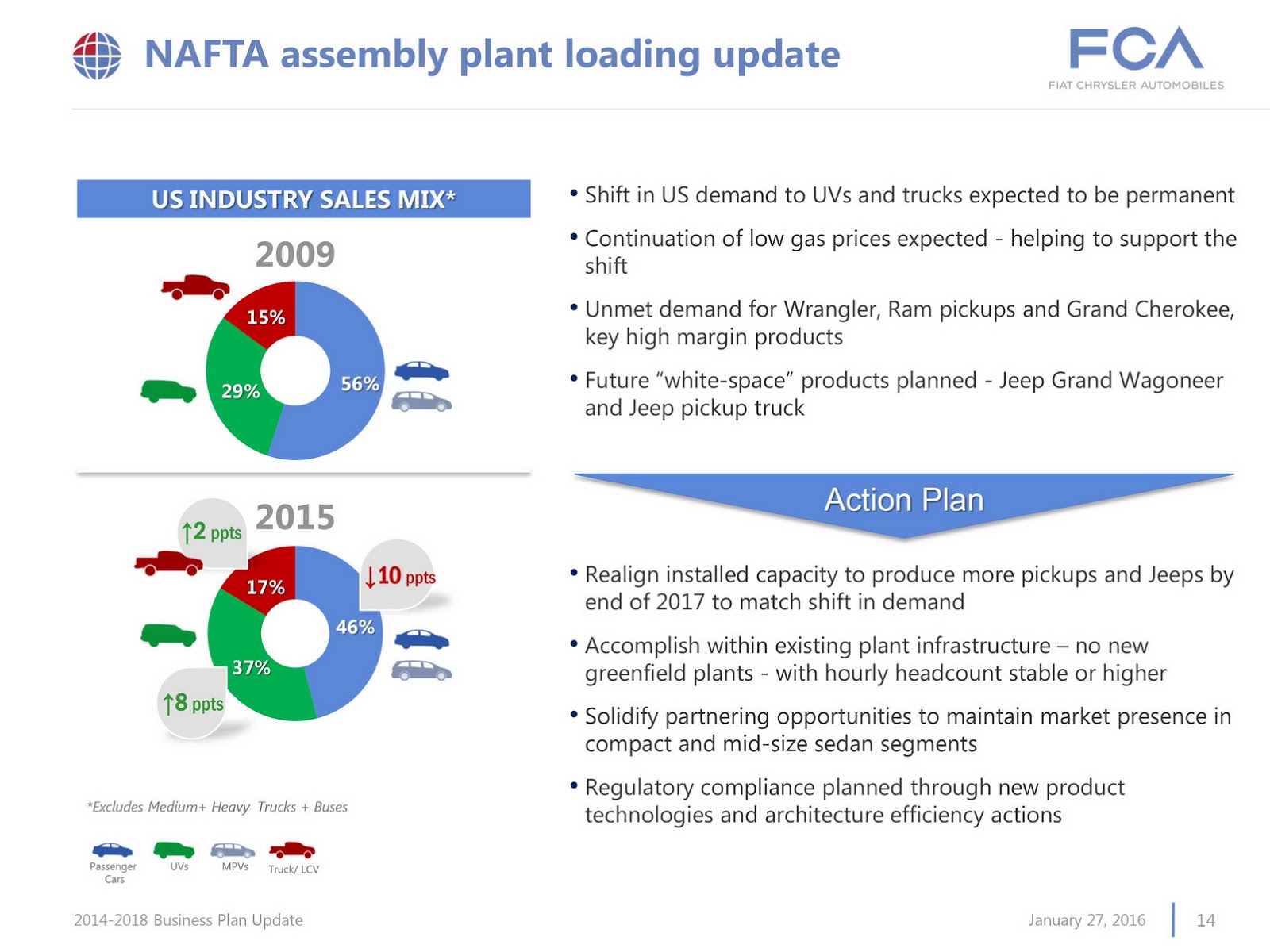
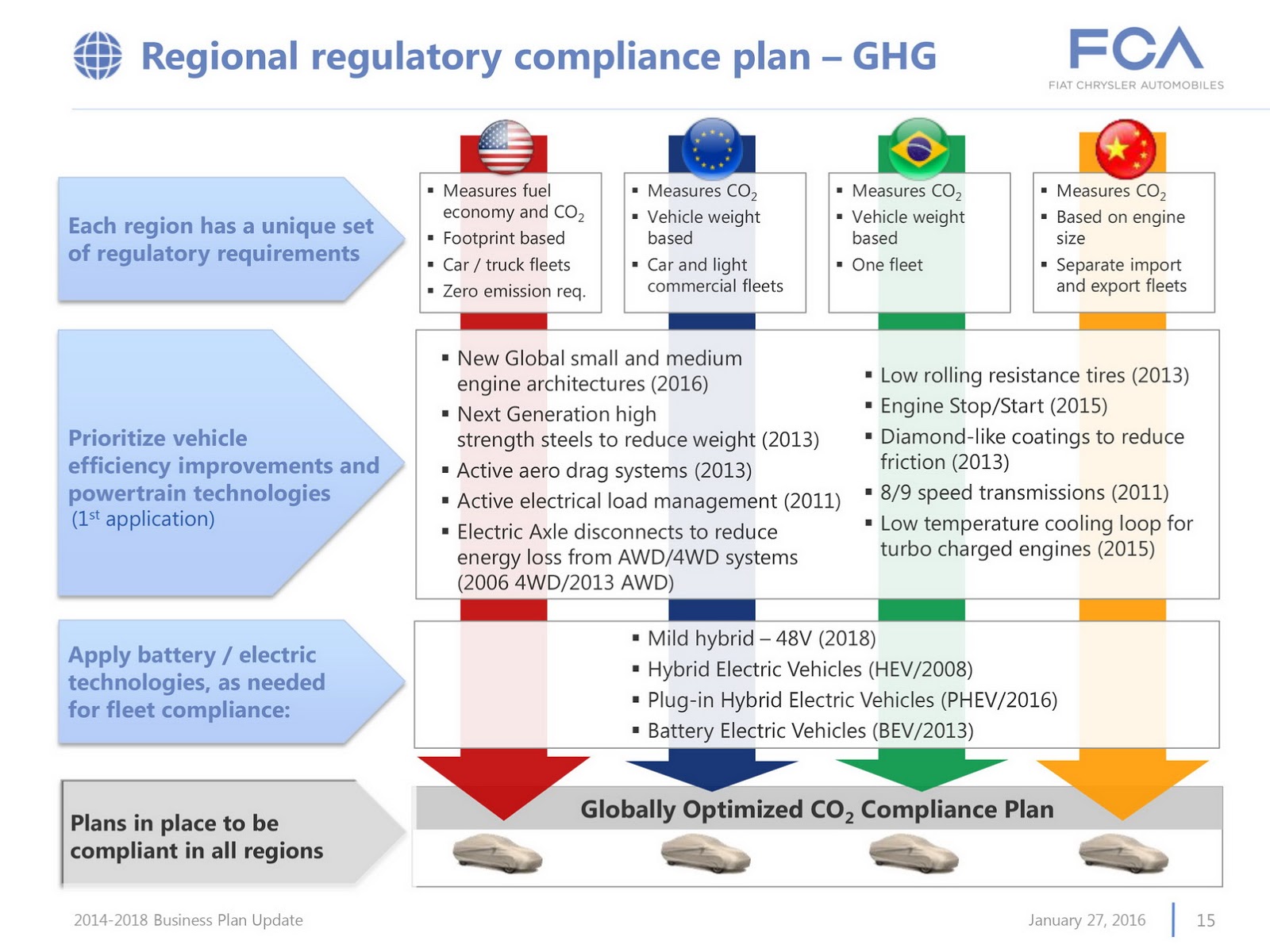
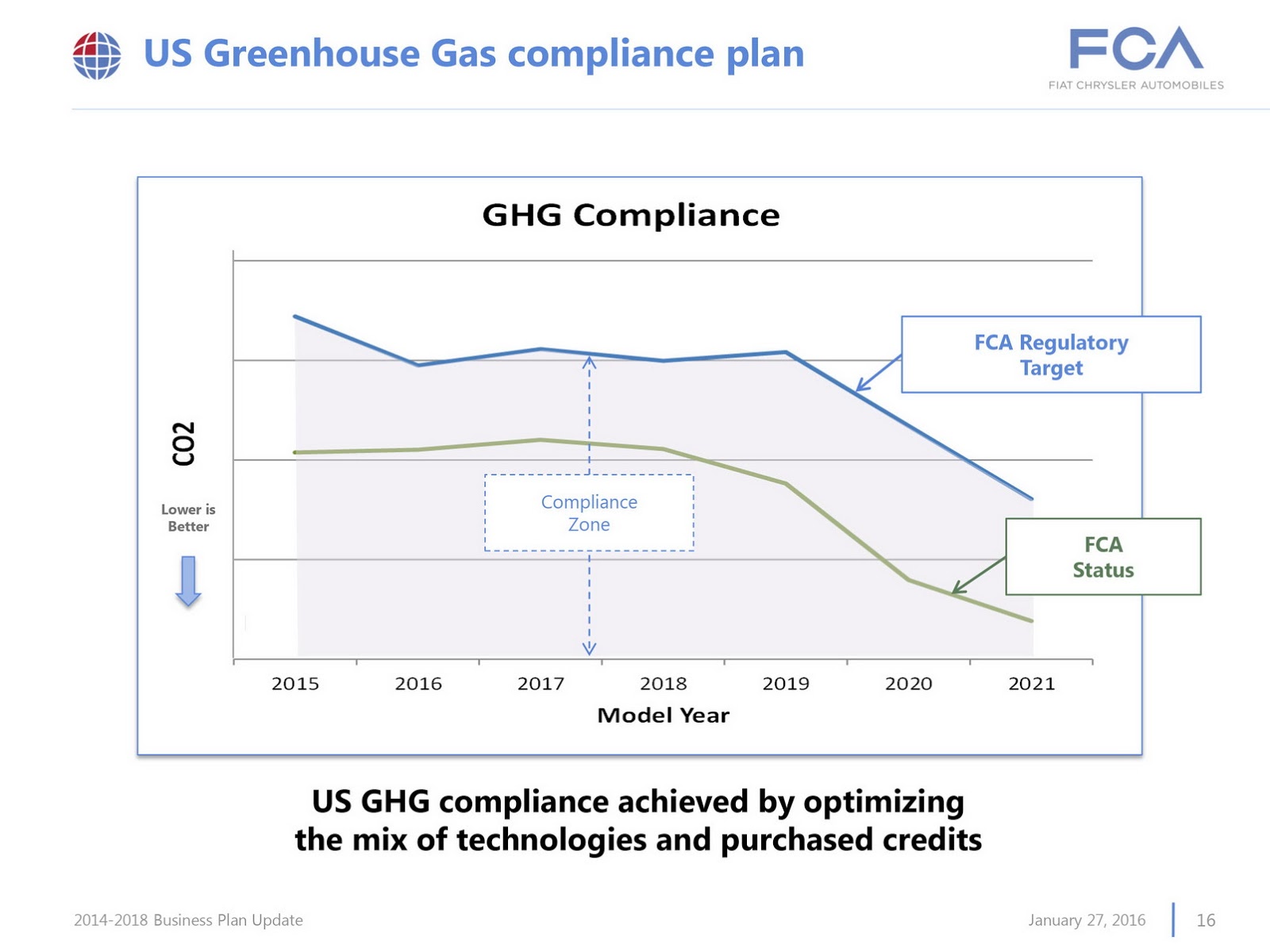
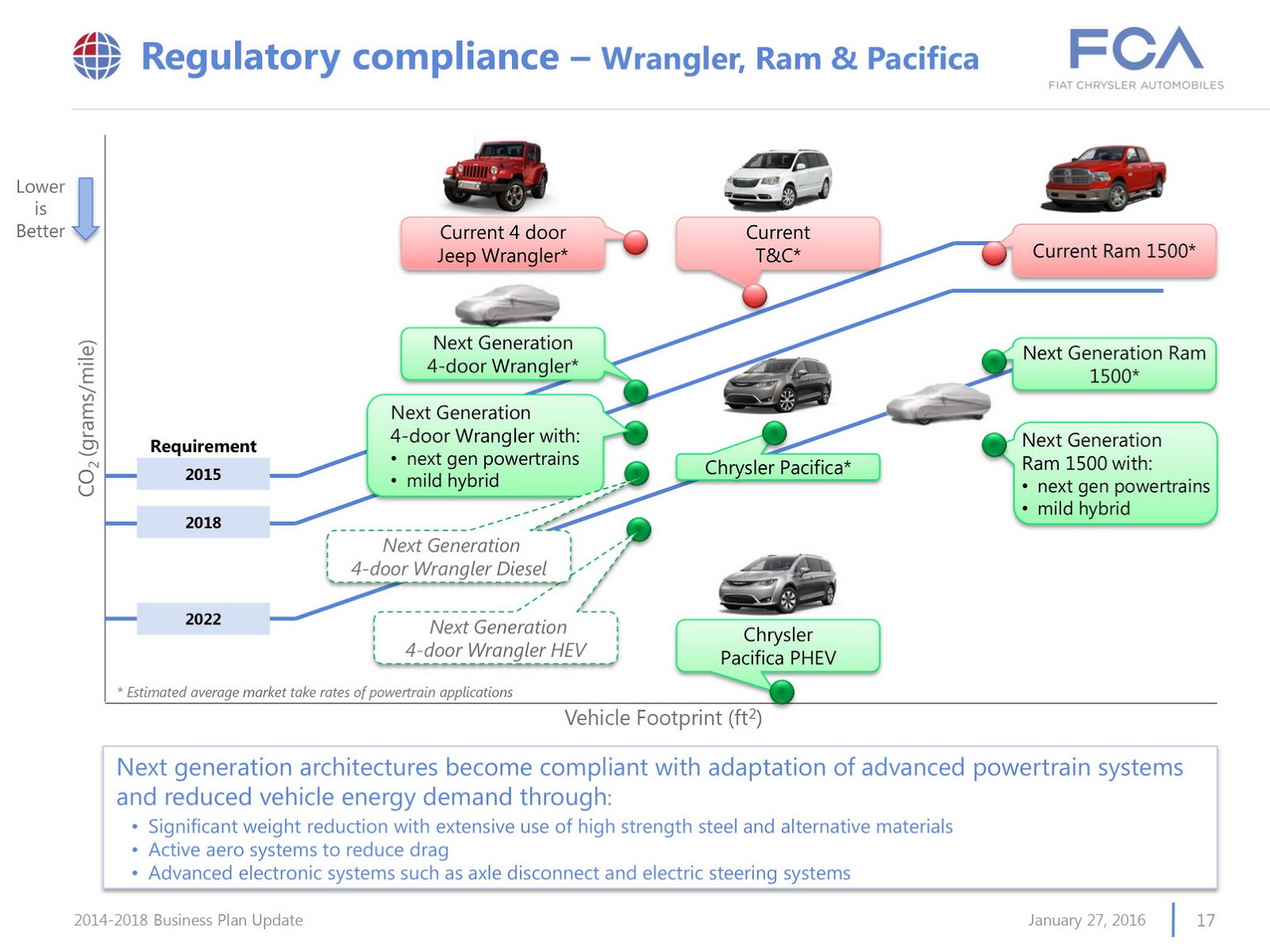
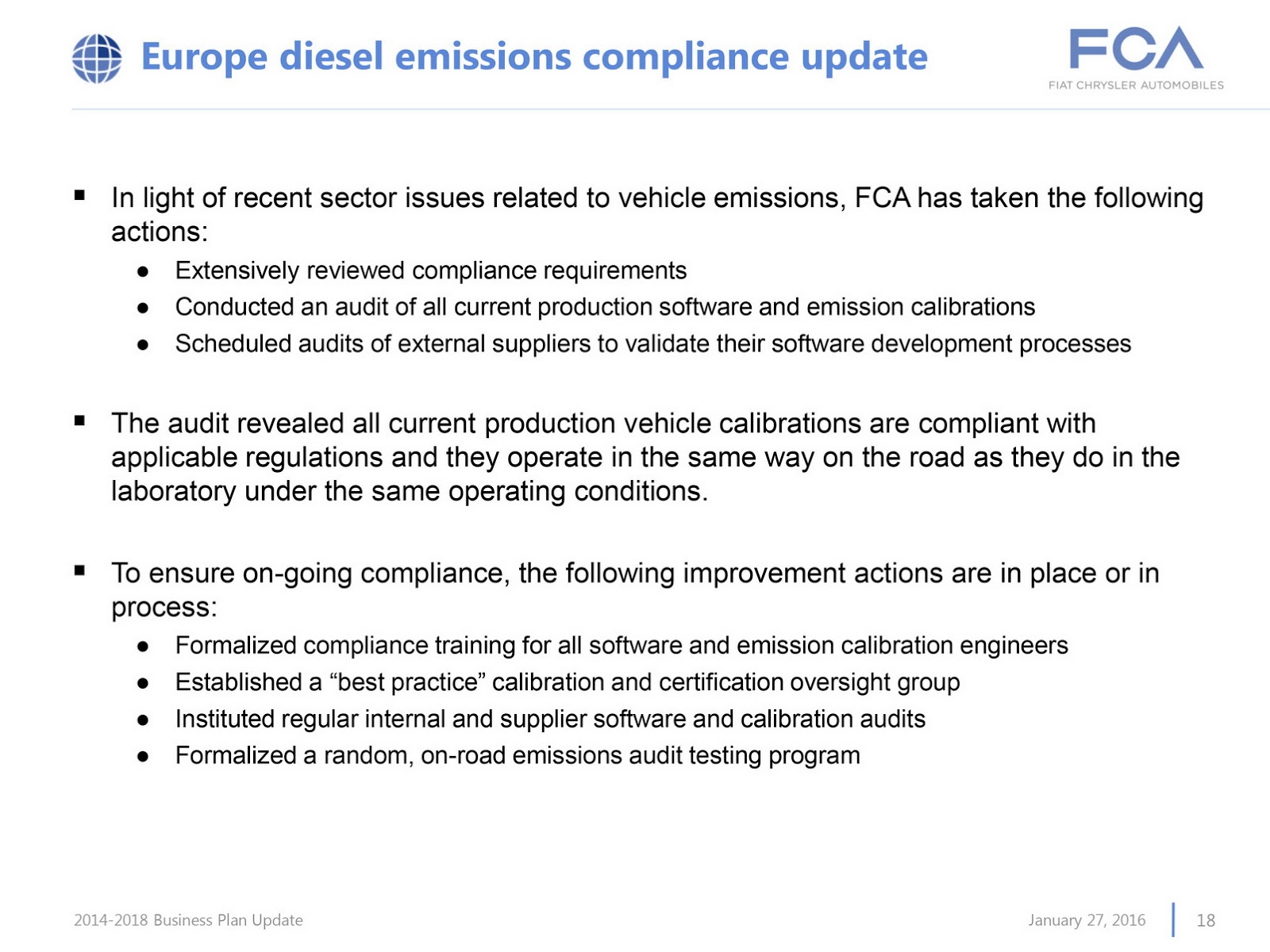
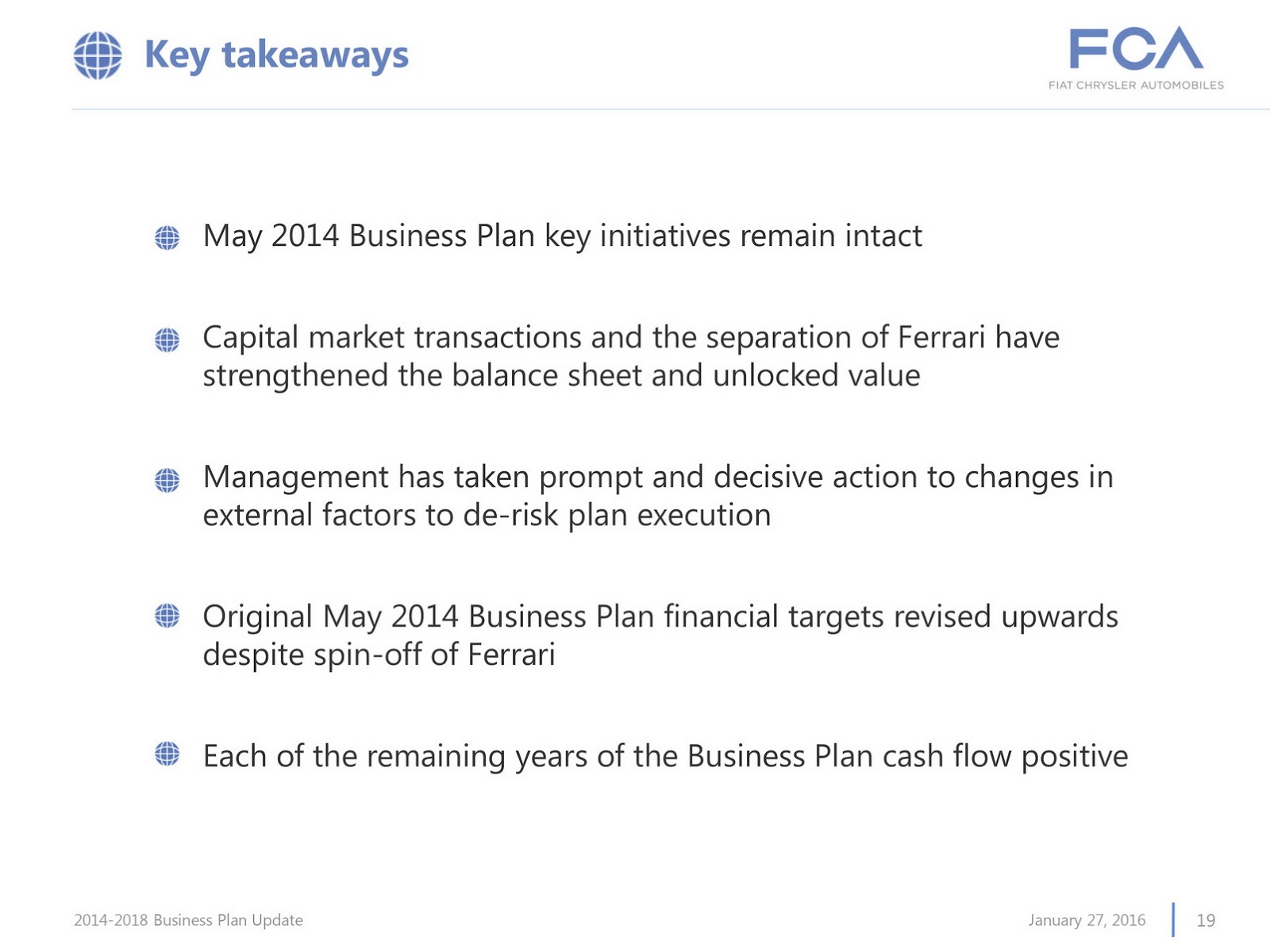
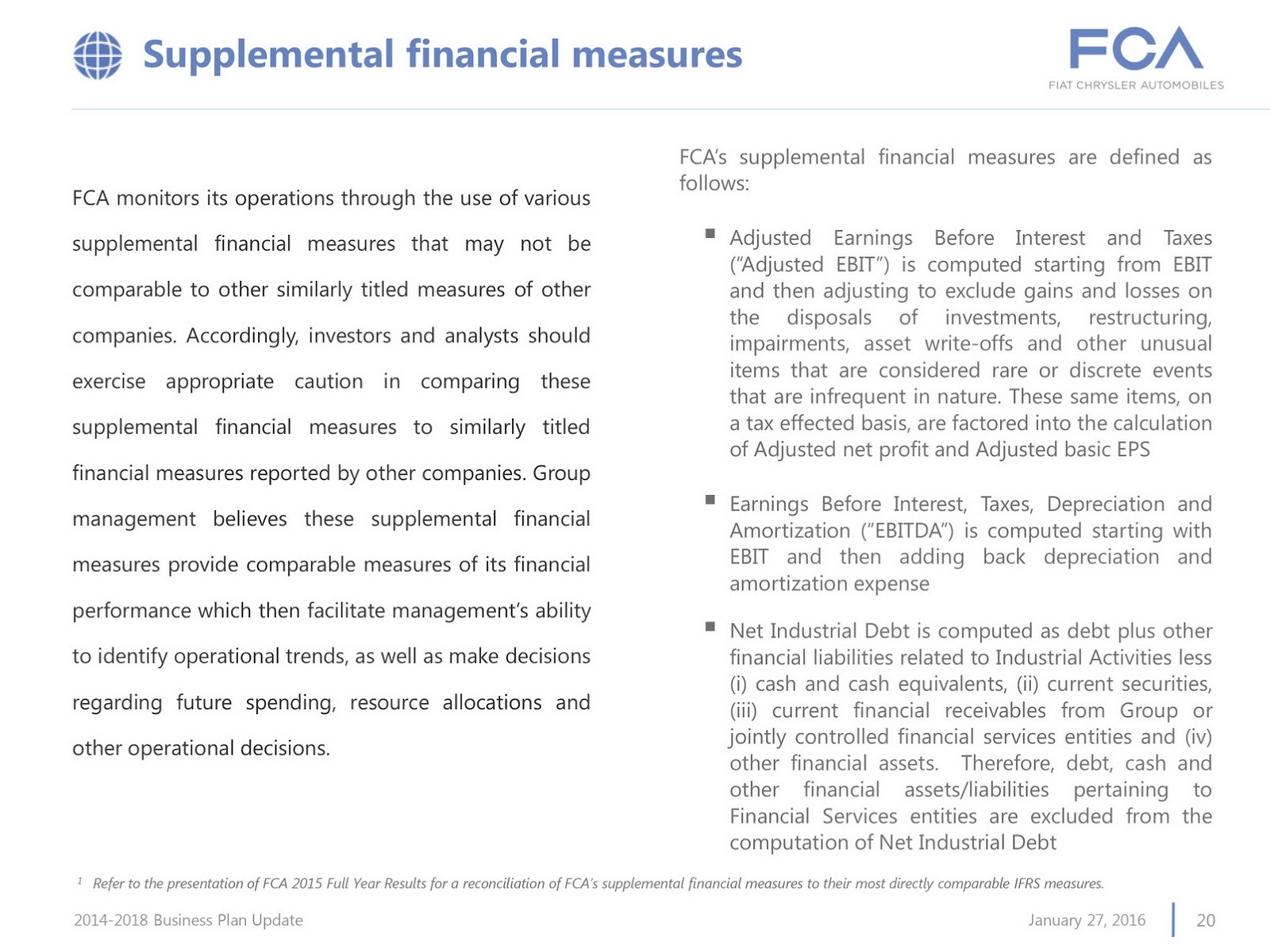
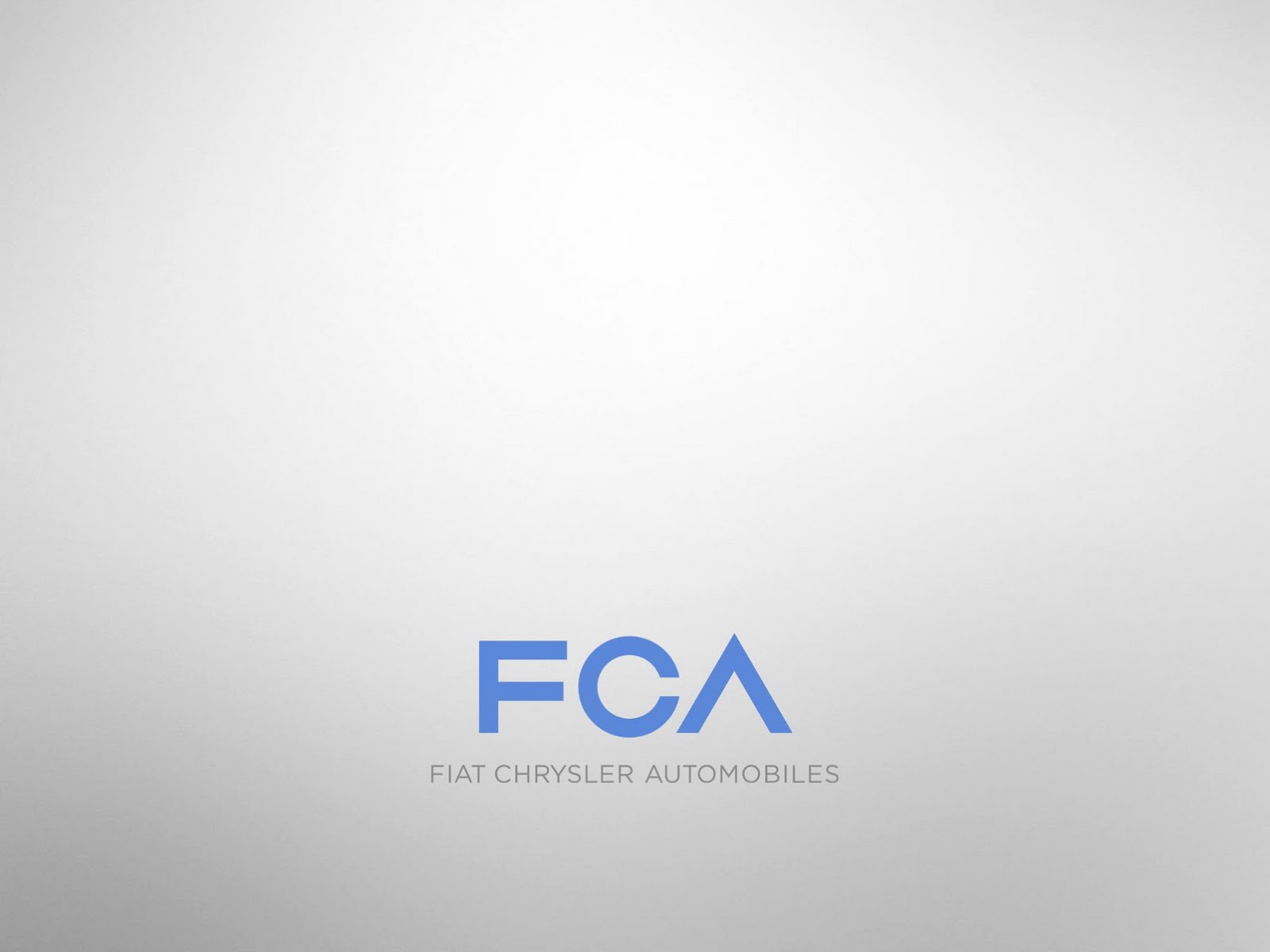
Fiat Chrysler Automobiles CEO Sergio Marchionne said today that the Dodge Dart and Chrysler 200 sedans will eventually be discontinued as the automaker refocuses its efforts on the production of its popular Jeep SUVs, Ram pickups and boosting its electric vehicle lineup.
Marchionne said the strategy is a response to market trends in the U.S. that include gas prices that have dropped to about $2 per gallon and a shift in buying patterns among Americans back to crossovers and trucks instead of cars.
The strategy also is designed to help the automaker boost production capacity for Ram and Jeep and suggests that the company will move the production of some of those models to other plants. Currently, the company cannot make enough Jeep Cherokees and Jeep Wranglers to meet demand and also struggles to make enough Ram pickups.
"We have decided to de-focus, from the manufacturing standpoint, to de-focus on the passenger car market. There are two cars in particular, the Dodge Dart and Chrysler 200, which will run their course," Marchionne said during a conference call with Wall Street analysts on Wednesday. "Without creating additional capacity, in the United States, we need to ... to try and deal with the development of both Jeep and the Ram brand."
The news is stunning, given the investments made to develop the Dart and the Chrysler 200. The automaker invested more than $1 billion to overhaul its Sterling Heights Assembly Plant to build an all-new Chrysler 200 midsize sedan that launched in 2014 and spent $600 million to launch the Dart compact car in 2012. To be fair, many of the improvements made at both plants help the automaker build any vehicle.
The Dart failed to meet sales expectations. It is among the larger compact cars on the market and is priced higher than competitors. Just over 87,000 were sold last year. The Chrysler 200 has been praised for its exterior styling and is viewed as a competitive car in its segment but has cramped rear seats.
Marchionne hinted that the Dart and Chrysler 200 could return to the market if FCA found another manufacturer willing to build the cars.
"There will be a number of things that will be put in place in the next 18 months -- things that have been agreed and detailed, that will effectively withdraw the Chrysler 200 and Dodge Dart from the marketplace, for a long period of time, during which we will be continuing discussions with potential partners," Marchionne said.
The automaker now is aiming to sell more than 2 million Jeeps globally by 2018, an increase from its prior target of 1.9 million annual sales. FCA sold more than 1.2 million Jeep SUVs globally in 2015 -- the most in the history of the brand.
While the strategy will help FCA find additional capacity for its most popular vehicles, it also positions the company as largely a manufacturer of trucks and SUVs. Removing small cars from the lineup leaves FCA vulnerable to gas price increases in the future.
Marchionne said decisions have been made to help the company achieve the production capacity it needs for Ram and Jeep. A number of plans will be put in place over the next 18 months, but he but did not outline those plans.
The Chrysler 200 is made in Sterling Heights and the Dodge Dart is made in Belvidere, Ill. The Free Press, along with a number of other publications, have previously reported that the automaker plans to move production of its Ram pickup to Sterling Heights and move its Jeep Cherokee to Belvidere, Ill. It also is expected that the Jeep Grand Wagoneer will be built at Warren Truck.
Marchionne did not confirm any of those moves today.
The automaker has said it will launch its next-generation Jeep Wrangler in 2017, and will make the Wrangler in Toledo in the plant where the Cherokee is currently made. The company has not said what vehicle it will produce in plant in Toledo where the Wrangler is currently made.
ďI think the important thing for us to reinforce is the fact that the Wrangler, in its new home in Toledo, will have additional production capacity available to try and meet demand on a global scale, and I think itís important for us to have found a home for the Grand Wagoneer family, both the Grand Wagoneer and the Wagoneer in whatever shape they come," Marchionne said.
There are also plans to add diesel and hybrid electric versions of the next-generation Jeep Wrangler when it goes on sale by 2018. The company also plans to offer "next-generation powertrains" on its next Ram pickup and produce a mild hybrid version of its Ram pickup.
In 2014, Marchionne unveiled a plan to spend $52 billion (48 billion euro) over five years in his quest to boost annual sales of cars and trucks from 4.6 million in 2014 to 7 million by 2018.
That plan leaned heavily on a goal to relaunch the Alfa Romeo and Maserati brands globally and counted on substantial future sales from China. FCA initially intended to spend $5.5 billion (5 billion euro) by 2018 to launch eight new Alfa Romeo models in a bid to make the sporty premium brand a true competitor with the likes of Audi, BMW, and Mercedes-Benz.
Today, FCA said it has extended its time frame for the introduction of those eight Alfa Romeo models to 2020 and has reduced the amount of money it plans to spend by 2018 on the brand.
Since announcing that plan, the outlook for the automotive industry in China has changed, forcing Marchionne to delay some Alfa Romeo models and move up the introduction of others.
Marchionne said the automaker still plans to launch the Alfa Romeo Giulia sedan in the U.S. by the end of the summer. While the small Alfa Romeo 4C roadster went on sale in the U.S. last year, the Giulia is expected to be the first car to appeal to mainstream premium car buyers since Fiat pulled the brand out of the U.S. in the mid-1990s.
Under the updated plan announced today, FCA said it will "recadence" the timing of the Alfa Romeo models and is now aiming for more sales to come from North America and Europe than in its prior plan.
What we know and what we don't know
A long-awaited, updated business plan released by Fiat Chrysler Automobiles CEO Sergio Marchionne answered a number of questions on Wednesday, but left many critical questions unanswered and raised new questions.
What we know that we didnít know before:
- There will be an increased focus on Jeep and on expanding the Jeep brand.
- FCA will focus greater resources on the development of hybrid and plug-in electric vehicles.
- The automaker may be planning both a Jeep Grand Wagoneer and a Wagoneer.
- The companyís plan is designed to relieve capacity constraints at Warren Truck, where the Ram is made, and in Toledo, where the Jeep Cherokee and Jeep Wrangler is made.
- FCA will offer a diesel version and a hybrid electric version of the next generation Jeep Wrangler.
- The Dodge Dart and the Chrysler 200 will eventually be phased out, at least for a period of time.
- FCA is talking to other manufacturers about the possibility of building passenger cars for the automaker in a partnership.
- FCA will develop a mild hybrid version of its next generation Ram pickup.
What we donít know (for sure):
- Where the next generation Jeep Cherokee will be built. (Various reports suggest Belvidere, Ill.)
- Where the next generation Ram pickup will be built. (Various reports suggest Sterling Heights Assembly.)
- When production of the Dodge Dart and Chrysler 200 will end.
- If FCA will be able to reach an agreement with another manufacturer to build passenger cars to replace the Dodge Dart and Chrysler 200.
- What will happen to Dundee Engine, which makes engines for the Dodge Dart, the Chrysler 200 and other vehicles.
Marchionne made comments about the "Wagoneer family" and mentioned the "Grand Wagoneer" and the "Wagoneer." It's unclear what this means. Before Wednesday, the company had only confirmed plans for one large Jeep Grand Wagoneer.





















#2
Cliff Notes
-200, Dart will take an eventual hiatus unless they find a partnership
-Hybrids coming to the Jeep and Ram lineup
-Alfa Romeo's will arrive in a different order spreading out to 2020 instead of 2018
-Marchionne mentioned both a Wagoneer and a Grand Wagoneer (?!)
-No new plants; focus is trying to maximize Ram and Jeep sales within current plan infrastructure, hence the deprioritization of Dart and 200
-Marchionne is bracing for a sales fall but is still confident in making profit targets by 2018
-200, Dart will take an eventual hiatus unless they find a partnership
-Hybrids coming to the Jeep and Ram lineup
-Alfa Romeo's will arrive in a different order spreading out to 2020 instead of 2018
-Marchionne mentioned both a Wagoneer and a Grand Wagoneer (?!)
-No new plants; focus is trying to maximize Ram and Jeep sales within current plan infrastructure, hence the deprioritization of Dart and 200
-Marchionne is bracing for a sales fall but is still confident in making profit targets by 2018
#3
Great report, thanks for sharing.
So like Jeep having the Cherokee and Grand Cherokee which are different sizes, they are planning a Wagoneer and Grand Wagoneer?!?! What the heck lol
Marchionne made comments about the "Wagoneer family" and mentioned the "Grand Wagoneer" and the "Wagoneer." It's unclear what this means. Before Wednesday, the company had only confirmed plans for one large Jeep Grand Wagoneer
#4
This sounds like a cop-out to me. GM, Ford, Toyota, VW, Hyundai/Kia can produce and sell international compact and mid-size cars that sell in North America but Fiat-Chrysler cannot, not even with Fiat and Alfa Romeo in its stable of brands? How about making the next batch of Fiat and Alfa Romeo cars global models, as Ford did with the Focus and Fusion / Mondeo, and what GM is doing with the Cruz and Malibu (and equivalent Opel/Vauxhall models)?
It seems to me that Chrysler wants the easy way out: Produce only trucks and utility vehicles, label and sell them all as trucks in North America and get an easier ride on CAFE requirements. Add a few diesels and hybrids in those trucks and they can boast that they are doing their bit for the environment.
It seems to me that Chrysler wants the easy way out: Produce only trucks and utility vehicles, label and sell them all as trucks in North America and get an easier ride on CAFE requirements. Add a few diesels and hybrids in those trucks and they can boast that they are doing their bit for the environment.
#6
While it does address several of FCA's marketing problems, the move away from "family" sedans may be a bit premature. While fuel prices are down for the present, a look back at variability of crude prices shows a regular 20-year boom-bust cycle they have followed for nearly a hundred years. If they get the timing wrong, they could roll out a fleet of big, thirsty SUV's just as the crude market blows up in their face. It's happened before.
While low now, thanks to the eco-political games being played in the Middle East, prices will eventually respond to tightening supply as flowing wells over there either play out or reservoirs are compromised by poor management during periods of variable activity. The worst-case scenario (and probably the most likely) is a serious political development (meaning a likely war) in the Middle East that will destabilize the price of crude worldwide by cutting off ME oil supply altogether. Then where will we be?
What is not being recognized here is that with Iran's petrodollars coming on stream over the next year or two, we may be looking at a few years of cheap gas BUT we will have given the ME has greater control than ever over the price of oil - and gasoline. We saw in 74 and again in 85, how quickly a turn of the oil tap halfway around the world can create gas lines here. It may not be a matter of price, but one of supply. Can we survive on 20 gallons per month before we can get our domestic production back on stream? Oil reservoirs are finicky things. You just can't shut in your wells and assume the oil they hold will just sit there. Modern "4D" seismology reveals that these reservoirs can "travel" over time, and the oil you thought was solidly trapped beneath you may have moved on. Shutting in a producing well can also lead to heavy paraffin deposits and other problems in the production string that will delay recovery until the well can be worked over and communication with the reservoir re-established. That won't happen overnight either.
We are going to need a mix of automotive products across the price spectrum to anticipate our needs in the future. Right now low gas prices might bring back the hulking SUV's of 20 years ago - even making them borderline affordable. I still love 'em, but I recognize that a good hiccup in crude prices could make the Suburban in my driveway worthless. I couldn't afford $5 gas for it and I wouldn't be able to sell it . . . maybe I could make a planter out of it.
For the future, Hybrids and full electrics are certainly part of the solution, but can they be pushed out the factory door faster than our current oil supply dries up? Would they offer the range and drivability we demand, and can they be sold at anything like a reasonable price? I would hope the automakers are readying a "Plan B" . . . and a "Plan C".
While low now, thanks to the eco-political games being played in the Middle East, prices will eventually respond to tightening supply as flowing wells over there either play out or reservoirs are compromised by poor management during periods of variable activity. The worst-case scenario (and probably the most likely) is a serious political development (meaning a likely war) in the Middle East that will destabilize the price of crude worldwide by cutting off ME oil supply altogether. Then where will we be?
What is not being recognized here is that with Iran's petrodollars coming on stream over the next year or two, we may be looking at a few years of cheap gas BUT we will have given the ME has greater control than ever over the price of oil - and gasoline. We saw in 74 and again in 85, how quickly a turn of the oil tap halfway around the world can create gas lines here. It may not be a matter of price, but one of supply. Can we survive on 20 gallons per month before we can get our domestic production back on stream? Oil reservoirs are finicky things. You just can't shut in your wells and assume the oil they hold will just sit there. Modern "4D" seismology reveals that these reservoirs can "travel" over time, and the oil you thought was solidly trapped beneath you may have moved on. Shutting in a producing well can also lead to heavy paraffin deposits and other problems in the production string that will delay recovery until the well can be worked over and communication with the reservoir re-established. That won't happen overnight either.
We are going to need a mix of automotive products across the price spectrum to anticipate our needs in the future. Right now low gas prices might bring back the hulking SUV's of 20 years ago - even making them borderline affordable. I still love 'em, but I recognize that a good hiccup in crude prices could make the Suburban in my driveway worthless. I couldn't afford $5 gas for it and I wouldn't be able to sell it . . . maybe I could make a planter out of it.
For the future, Hybrids and full electrics are certainly part of the solution, but can they be pushed out the factory door faster than our current oil supply dries up? Would they offer the range and drivability we demand, and can they be sold at anything like a reasonable price? I would hope the automakers are readying a "Plan B" . . . and a "Plan C".
#7
I said it in another thread, but this is a very bad sign about the financial health of FCA.
They obviously can't produce a competitive small or midsize car and turn a profit. Which I don't get why, Fiat has been making small cars for years, use their expertise, sell the same thing in Europe and the US like Ford does with the Focus and Fiesta.
I predict that 2-4 years out from now FCA is going to have a bunch of SUV's and trucks for sale when gas spikes to $5 a gallon and they'll have nothing to sell that gets better than 25mpg.
They obviously can't produce a competitive small or midsize car and turn a profit. Which I don't get why, Fiat has been making small cars for years, use their expertise, sell the same thing in Europe and the US like Ford does with the Focus and Fiesta.
I predict that 2-4 years out from now FCA is going to have a bunch of SUV's and trucks for sale when gas spikes to $5 a gallon and they'll have nothing to sell that gets better than 25mpg.
Trending Topics
#8
This sounds like a cop-out to me. GM, Ford, Toyota, VW, Hyundai/Kia can produce and sell international compact and mid-size cars that sell in North America but Fiat-Chrysler cannot, not even with Fiat and Alfa Romeo in its stable of brands? How about making the next batch of Fiat and Alfa Romeo cars global models, as Ford did with the Focus and Fusion / Mondeo, and what GM is doing with the Cruz and Malibu (and equivalent Opel/Vauxhall models)?
It seems to me that Chrysler wants the easy way out: Produce only trucks and utility vehicles, label and sell them all as trucks in North America and get an easier ride on CAFE requirements. Add a few diesels and hybrids in those trucks and they can boast that they are doing their bit for the environment.
It seems to me that Chrysler wants the easy way out: Produce only trucks and utility vehicles, label and sell them all as trucks in North America and get an easier ride on CAFE requirements. Add a few diesels and hybrids in those trucks and they can boast that they are doing their bit for the environment.
Despite this weak gas argument, I think he knows good and well he'll find someone to partner with to put out a decent entry in the compact and midsize car market with minimal investment. The Fiat 124 and Miata tie up was just a sign of things to come.
#9
#10
#13
#15
Check out what Mark Fields, Ford CEO said today: http://www.reuters.com/article/ford-...-idUSL2N15C3CY
Mr. Marchionne still has some more tricks up his sleeve I think.
Mr. Marchionne still has some more tricks up his sleeve I think.






